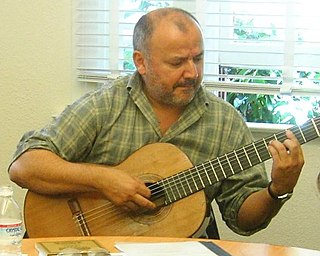Nueva canción is a social movement and musical genre in Iberian America and the Iberian peninsula, characterized by folk-inspired styles and socially committed lyrics. Nueva canción is widely recognized to have played a profound role in the social upheavals in Portugal, Spain and Latin America during the 1970s and 1980s.

Violeta del Carmen Parra Sandoval was a Chilean composer, songwriter, folklorist, ethnomusicologist and visual artist. She pioneered the Nueva canción chilena, a renewal and a reinvention of Chilean folk music that would extend its sphere of influence outside Chile. Parra is acknowledged as "the Mother of Latin American folk". In 2011, Andrés Wood directed a biopic about her, titled Violeta Went to Heaven.
Quilapayún are a folk music group from Chile and among the longest lasting and most influential ambassadors of the Nueva Canción Chilena movement and genre. Formed during the mid-1960s, the group became inseparable with the revolution that occurred in the popular music of the country under the Popular Unity Government of Salvador Allende. Since its formation and during its forty-year history - both in Chile and during its lengthy period of exile in France - the group has seen modifications to its personnel lineup and the subject and content of its work. Controversy regarding irreconcilable differences with the current and former group directors led to the division into two distinctive Quilapayún ensembles; one in Chile (Quilapayún-Histórico) and one in France (Quilapayún-France).

Inti-Illimani are an instrumental and vocal Latin American folk music ensemble from Chile. The group was formed in 1967 by a group of university students and it acquired widespread popularity in Chile for their song Venceremos which became the anthem of the Popular Unity government of Salvador Allende. At the moment of the September 11, 1973 Chilean coup they were on tour in Europe and were unable to return to their country where their music was proscribed by the ruling military junta. In Europe their music took on a multifarious character, incorporating elements of European baroque and other traditional music forms to their rich and colourful Latin American rhythms - creating a distinctive fusion of modern world music. They are perhaps the best internationally known members of the nueva canción movement. Their name means 'Sun of the Illimani.' In Aymara Illimani is the name of a mountain in the Bolivian Andes. They influenced Yeni Türkü, a Turkish group, during their debut album, Buğdayın Türküsü in 1979.

Horacio Salinas Álvarez is a Chilean guitarist and composer. He is cofounder and musical director of the Chilean group Inti-Illimani Histórico. He has a huge repertory of compositions that involves folk, Andean music, protest music, world music, contemporary classical music and many Latin American styles and fusions. In 1973, his group was touring in Europe when Pinochet seized power in Chile, after which they had to stay in exile for years. He has played with many international musicians notably the Australian classical guitarist John Williams.
Quilapayún is the self-titled debut album released by the Chilean musical group Quilapayún in 1966.

Pongo en tus manos abiertas is an album recorded by Víctor Jara with the musicians from Quilapayún in June, 1969. It was the third album released by the DICAP record label.

La Población is a music album by Chilean folk singer and songwriter Víctor Jara, recorded and released in 1972 and reissued in 2001. It was recorded in homage of the struggle of people living in the poorest working class districts of Santiago de Chile, sometimes referred to as “shanty towns”. The album included the collaborative work between Jara and the Chilean writer Alejandro Sieveking. The other artists included on the album were, Isabel Parra, Bélgica Castro, Huamarí, and Cantamaranto.
Tiempos que cambian was scheduled to be the ninth studio album by Chilean songwriter Víctor Jara as a soloist, but was left incomplete due to the murder of the songwriter by the Chilean military in the 1973 military coup d'état. Originally, the album was planned to be named Tiempos Nuevos , but later on the title was modified to the present version.

Víctor Jara (Geografía) is the name of the first studio album recorded by the Chilean folk-singer/songwriter, Víctor Jara in 1966 which was released by RCA (Demon) early in 1967.
Patricio Manns is a Chilean composer, author, poet, novelist, essayist, play writer and journalist.
Patricio Castillo is a Chilean musician and former member of the Chilean folk music group Quilapayún.
Grandes Chilenos de Nuestra Historia was a Chilean TV program produced and broadcast by state channel Televisión Nacional de Chile during 2008. It was based on the style of BBC's 100 Greatest Britons. Former President Salvador Allende was elected the "Greatest Chilean".

Maira María Luisa Sepúlveda was a Chilean composer and music educator.
Manifiesto is the ninth solo studio album from Chilean songwriter Víctor Jara. It was edited after his death, using as a base the songs written for the album Tiempos que cambian , that was left unfinished.
The Nueva Canción Chilena or "New Chilean Song” was a movement and genre of Chilean traditional and folk music incorporating strong political and social themes. The movement was to spread throughout Latin America during the 1960s and 1970s, in what is called "Nueva canción" sparking a renewal in traditional folk music and playing a key role in political movements in the region.
María Francesca Ancarola Saavedra is a Chilean singer and songwriter. Ancarola’s musical style is a mix of folk and jazz, with social justice themes, and she is considered a part of the Chilean New Song movement.







